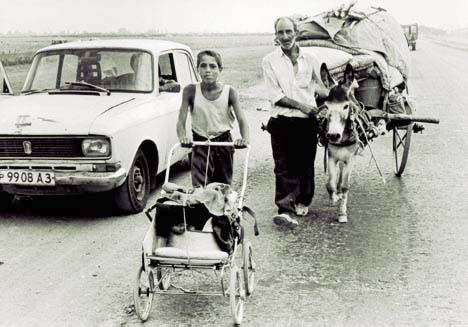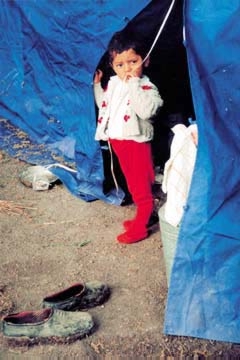|

Summer 2000 (8.2)
Pages
72-73
Refugees and
Euphemisms
Forgotten
People - A Borderline Difference
by Richard
Holbrooke U.S. Ambasador to the United Nations
Published in The Washington Post, May 8, 2000; page A23
Reprinted with permission from the author, Richard Holbrooke

Above: Azerbaijan lost nearly
20 percent of their land to Armenian military occupation beginning
around 1992. As a result nearly 1 million Azerbaijanis have been
left homeless. A ceasefire has been in effect between Azerbaijan
and Armenia since May 1994. Azerbaijanis still want their land
back. Most people who were displaced still live under abominable
conditions. Photo: Oleg Litvin, 1993.
AI Editor:
The majority of Azerbaijan's refugees fall into the category
that U.S. Ambassador Holbrooke describes below. The U.N calls
them "IDPs" - Internally Displaced Persons. Somehow,
it doesn't sound as tragic as the word "refugees".
But hundreds of thousands of Azerbaijanis were forced to flee
their towns and villages in Karabakh and the surrounding regions
in the early 1990s when Armenians occupied their land by military
force. Helpless, they were left to fend for themselves and find
refuge in other parts of their native land - Azerbaijan.
The personal loss is indescribable. Most of them have lost all
of their personal belongings, their sense of belonging to the
land and community, the graves of their ancestors, their source
of income, their position and role in society. As Holbrooke points
out, they may even suffer more than "official" refugees
do simply because of the way the international community perceives
their situation.

Above: Fleeing in 1993. Photo:
Oleg Litvin
_____
Imagine that you and your family are forced at gunpoint to flee
your home; or that your house is burned to the ground and you
have to go elsewhere for food, water and shelter. You wouldn't
care much where you ended up, as long as it was safe and you
got assistance.
  But
there's a catch. If, in your flight, you crossed an international
border, then you became an official refugee, eligible for assistance
from the U.N.'s High Commissioner for Refugees (UNHCR). However,
if you stayed within your own country the UNHCR would not take
care of you. But
there's a catch. If, in your flight, you crossed an international
border, then you became an official refugee, eligible for assistance
from the U.N.'s High Commissioner for Refugees (UNHCR). However,
if you stayed within your own country the UNHCR would not take
care of you.
You might get some limited international aid, but not much of
it. Your fate would be left in the hands of your government -
even if that government's oppression was the very reason you
fled in the first place, or if the government was unwilling or
unable to allow access. You would be classified by the international
community as an "internally displaced person" - an
IDP - and pretty much ignored.
Of course, there is no real difference between an "official
refugee" and an internally displaced person - especially
to the victim. The sterile and bureaucratic initials IDP have
been enshrined in U.N. and international legal documents, but
they are a euphemism that allows the world to ignore an enormous
problem.
We're talking about a huge number of nearly forgotten people.
Today, there are at least 20 million internal refugees worldwide.
The number of "official" refugees, on the other hand,
has declined steadily since 1992 and now numbers about 11 million.
While both figures are disturbing, the trends clearly have reversed.
In Sudan, for example, nearly 4 million people have been internally
displaced; in Sri Lanka, more than 600,000; in Azerbaijan, more
than a half-million, many of whom live in railroad cars. According
to recent estimates, the Congo has more than a million internal
refugees.
As Julia Taft, Assistant Secretary of State for Population, Refugees
and Migration, has repeatedly noted, the number of internal refugees
has more than doubled during the past two decades. The rise in
these numbers represents a subtle but noticeable shift in geopolitics:
During the Cold War, refugees crossed borders to escape governmental
threats. But conflicts in the 21st century (Chechnya, the Congo,
Angola) are more fractured. Internal refugees in the Congo, for
example, are fleeing a multiplicity of armies from five countries,
as well as an even larger number of rebel movements.
The support the international community provides to such people
is woefully, horribly inadequate. While Sadako Ogata, the dynamic
head of the UNHCR, recently issued a more forward-leaning paper
on internal refugees that acknowledged the "uneven and in
many cases inadequate" response to this issue, humanitarian
aid donors continue to make far fewer resources available to
internal refugees than to others. Non-governmental organizations
and the Red Cross do give some assistance to such refugees, but
they cannot handle the situation alone. Moreover, the U.N. system's
reliance on what is called "coordinated" response all
too often turns out to be another euphemism - for ineffectiveness,
in this case. In bureaucracies, "co-heads" usually
means "no-heads." Victims fall through the cracks.
The primary mandate for internal refugees should be given to
a single agency, presumably the UNHCR. This suggestion has been
criticized by some in the international community as unfair to
other agencies, but no one should be defensive when it comes
to taking action. Criticism ought to be welcomed if it stimulates
reform.
The international community should consider proposals to meet
the following objectives:
- Designate a
lead agency for each internal refugee situation that arises and
clearly define that agency's responsibilities. In most cases,
it will be UNHCR.
- Have all U.N.
humanitarian agencies designate a single point of contact on
internal refugees.
- Keep better
track of these emergencies. For example, the U.N. Secretary General
should issue regular, comprehensive country-by-country reports
on the state of the world's displaced people and what the U.N.
is doing about them.
- Make it clear
that protecting and speaking up for internal refugees is just
as important as making such efforts for "official"
refugees. Unfortunately, some humanitarian and development agencies
still don't seem to see that as part of their mandate.
- Do more to
support the efforts of Francis Deng, the Secretary General's
Special Representative on Internal Refugees, who has played a
seminal and visionary advocacy role. Deng is a part-time, voluntary
employee who receives budgetary support for only a few trips
a year and is dependent upon other U.N. agencies for staff support.
If we can draw
the world's attention to the plight of these people; if we can
pressure governments to protect these innocent victims and secure
access for aid groups; and if we can design assistance programs
around the principles of predictability, accountability and universality
- then we will have taken a major step toward alleviating this
serious problem. We can ignore it no longer.
From Azerbaijan
International
(8.2) Summer 2000.
© Azerbaijan International 2000. All rights reserved.
Back to Index
AI 8.2 (Summer 2000)
AI Home
| Magazine Choice | Topics
| Store
| Contact
us
|



